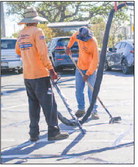Scam Alert
A Mutual 2 resident who thought she was helping her grandson packed $9,000 into a FedEx box and shipped it overnight to Philadelphia before she realized that she had been taken in by a scammer.
She doesn’t want anyone else in Leisure World to endure the distress she has suffered since Sept. 21, when a fake grandson called her to request bail money. The call came in at about 8:45 a.m. A man called her “grandma” and the woman replied, “Jacob, is that you?” Then “Jacob” proceeded to tell a tale of woe involving an arrest and his urgent need for money. He instructed her to send cash overnight to a Philadelphia address. The resident withdrew $9,000 and followed directions.
After discussing the situation with a friend, the resident realized her mistake and went to the Seal Beach police, her credit union and bank.
“I’ve been so stressed about this,” said the woman. She wanted other LWers to learn from her experience.
“It’s important to ask questions and not give them any information,” she said. “As soon as the person said, ‘Grandma, I’m in trouble,’ I replied, ‘Jacob, is that you?’” Police, working with FedEx and the credit union fraud unit, were able to recover the box of cash, so she’s not out money, but the stress levels were almost as costly, she said.
More than anything, she wants her LW friends and neighbors to be on guard against ever-increasing scammers preying on people.
To that end, AARP lists some things you can do to protect yourself:
• Set the privacy settings on your social media accounts so that only people you know can access your posts and photos. Scammers search Facebook, Instagram and other social networks for family information they can use to fool you.
• Ask questions someone else is unlikely to be able to answer, such as the name and age of the grandchild who is supposedly calling.
• Say you’ll call right back, then call your grandchild’s usual phone number. With luck, he or she will answer, and you’ll know that the supposed emergency call is a scam.
• Contact other family members or friends and see whether they can verify the story. Scammers plead with you to keep the emergency a secret precisely so you won’t try to confirm it.
• If you speak to someone who claims to be a police officer, call the relevant law enforcement agency to verify the person’s identity and any information they’ve given you.
• Trust your instincts. If something doesn’t feel right, it probably isn’t.
• Don’t drop your guard because the number on your caller ID looks familiar. Scammers can use technological tricks to make it appear that they’re calling from a trusted number, the Federal Communications Commission warns.
• Don’t volunteer information — scammers fish for facts they can use to make the impersonation believable.
• Don’t let a caller rush you into making a decision.
• Don’t send cash, wire money or provide numbers from gift or cash-reload cards to a person claiming to be a grandchild. Scammers prefer those payment methods because they’re difficult to trace.
•Don’t panic, no matter how dire the grandchild’s predicament sounds. Scam artists want to get you upset to distract you from spotting the ruse.
You can report any fraud targeting older people to the FTC online or (877) 382-4357. You might also want to notify your consumer protection office.




